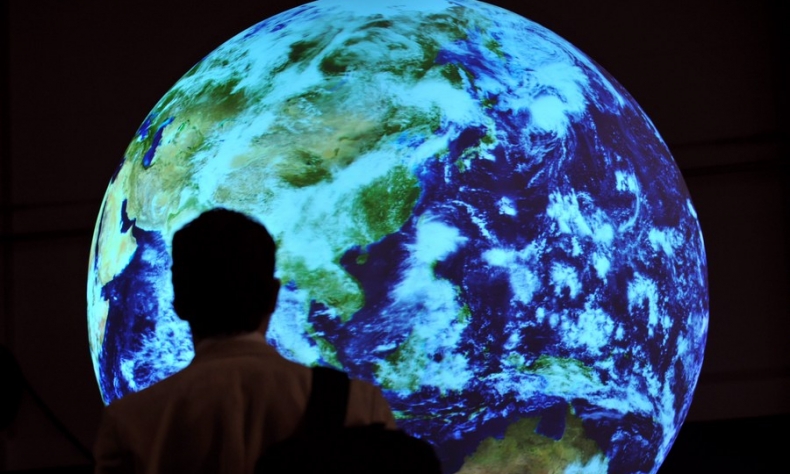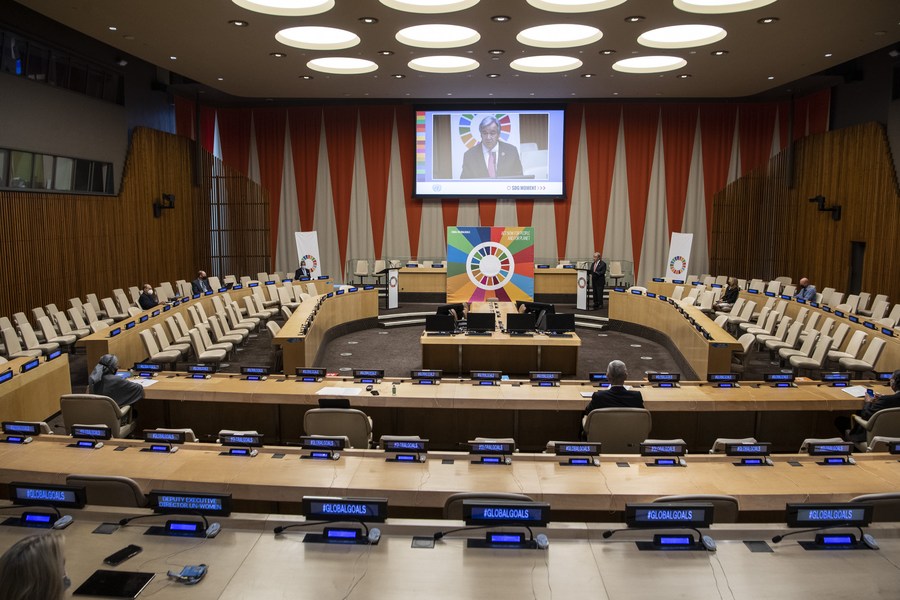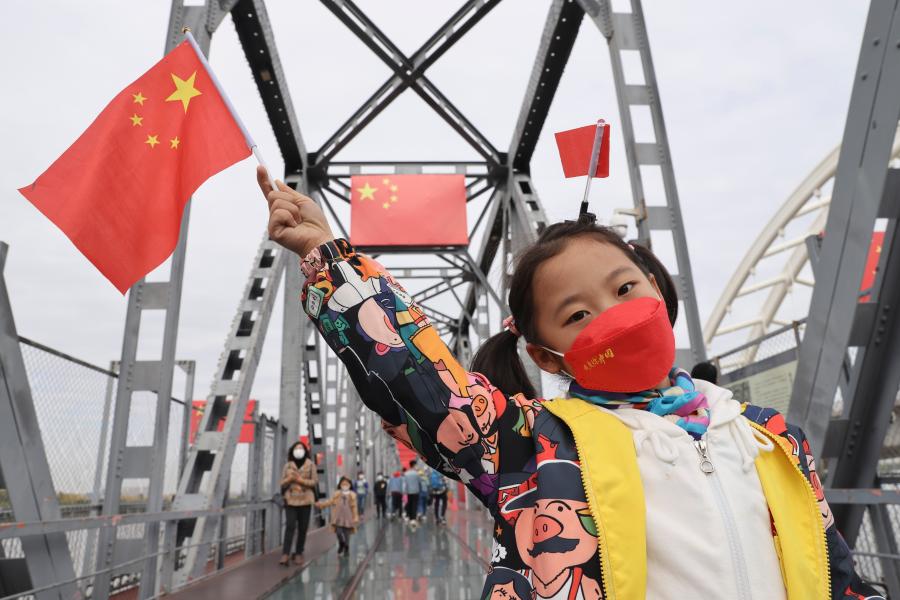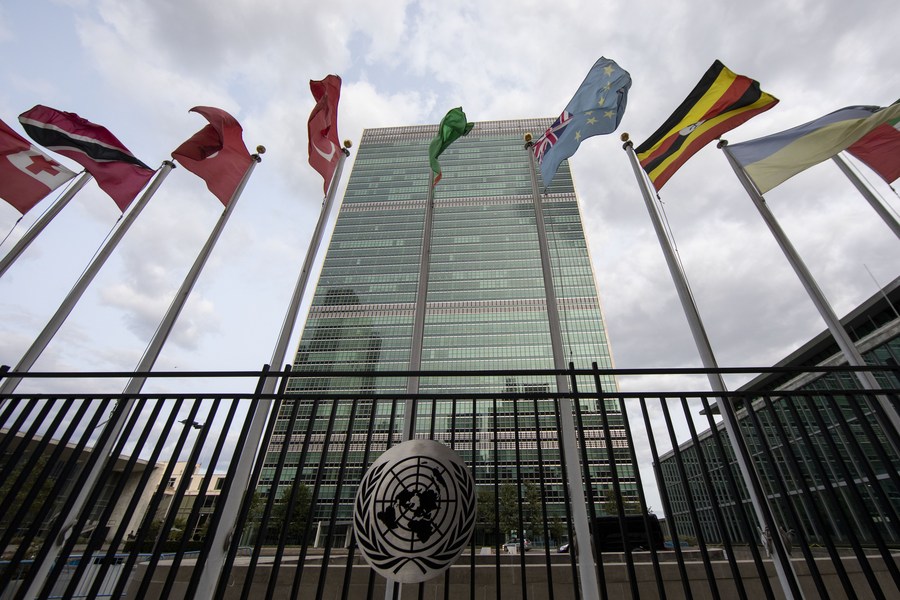Why We All Should Join China’s Global Development Initiative?

A successful GDI may give us a good opportunity to keep us all together. It may significantly contribute to retaining world peace, whilst we combine the well-being of the planet with that of ourselves.
Editor’s Note: Greater cooperation is needed in face of unprecedented challenges. It is high time to embrace diversity between countries and work together to make the world a better place. The China-proposed Global Development Initiative (GDI) is aimed at helping countries realize the UN Sustainable Development Goals and improving the well-being of people. This was a speech delivered by Ms. Annette Nijs at the International Symposium on Chinese Path to Modernization and Global Development Initiative. Authorized by the Academy of Contemporary China and World Studies, the speech is published by China Focus.
End of June this year (2022), I was interviewed by the Southern Metropolis Daily. It was for a special series called ‘Hand in hand towards the future – A visit to the international friends who met face-to-face with General Secretary Xi’.
This year 2022, China and my home country The Netherlands, celebrate 50 years of diplomatic relations. This, together with the fact that in 2015 I was awarded the “Foreign Friendship Award” by the Chinese government, made me an ideal interview candidate.
Allow me to repeat here the 3 quotes of the interview, which were highlighted by the newspaper and which also form the basis of this article on ‘Embracing Diversity, Why We All Should Join China’s Global Development Initiative’.
- “The 21st century is the century of China”
- “It’s awesome to think in terms of the future of human development”
- “China brings many new opportunities to the world”
To me, it is important that the world gets behind China’s Global Development Initiative (GDI). In President Xi Jinping’s speech ‘Bolstering Confidence and Jointly Overcoming Difficulties To Build a Better World’, which he delivered via video to the 76th Session of the United Nations General Assembly on Sept. 21 2021, he urged the world to stay committed to development as a priority on the global macro policy agenda. He urged the world to speed up the implementation of the UN 2030 Agenda for Sustainable Development by focusing on results-oriented actions.
I couldn’t agree more. The GDI is important not only for improving the well-being of people and that of our planet. It is of equal importance to maintain world peace by making nations work together on something in which they all believe irrespective of their differences: the 17 UN Sustainable Development Goals (SDG). The 2030 Agenda of the 17 SDGs was adopted by all United Nations Member States in 2015, and ‘provides a shared blueprint for peace and prosperity for people and the planet, now and into the future’. A call was made to achieve the goals by 2030.
The Circle of Friends of GDI currently consists of some 130 countries, quite an achievement within one year after the above-mentioned speech from President Xi at the UN. But we need more countries to join. Wouldn’t it be something if all other countries in the world would join this Circle of Friends of GDI, especially also countries from the West including my own home country? That, to me must be the final objective of GDI.
To me, we live in a world with ample space for Western, Eastern and other ideologies. In many countries people with different backgrounds, origin, ideologies and outlook on life are living peaceful together. It is high time to embrace diversity between countries and work together to make the world a better place. We are living in restless times, which we need to bring to a good end. So, what stands in our way? How can GDI further grow into a world-wide initiative?

The 21st century is the century of China
The current geopolitical tensions do not make it easy to get the whole world behind one idea, let alone to get the whole world working together on one idea.
The war in Europe is feeding geopolitical tensions. Many in this world do not only see a war between Ukraine and Russia. They also see the war as an illustration of rising tension between the U.S. (as a supporter of Ukraine) and China (who has not condemned Russia).
For the West the latter is hard to grasp or accept. China’s position became clear after the vote of the U.S. resolution in the UN on the Ukraine war in early March 2022. Some 141 countries voted in favour of the resolution; A few voted with Russia; some 35 countries including China abstained. Why did China choose to abstain? And why did other countries, including India, South Africa, Pakistan, Nicaragua, Cuba, Iran and Iraq do the same?
To understand this a little history lesson may help for many of us in the West. In 1955 at the time of the Cold War between Russia (the former Soviet Union) and the U.S., the Asia-African Bandung conference was held on West Java, Indonesia. There, a large number of countries, which represented more than half of the global population at the time, formed the so-called Non-Alignment Group: they did not choose the side of Russia nor that of the U.S. They refused to make a choice between either one of them and embraced the aspiration for a world without imperialism or colonialism. In the same ‘Bandung Spirit’ China – and 34 other countries – abstained this time, in 2022, to choose between Russia and the U.S. To me, China’s abstention is a rather positive outcome and only to be expected given the close relationship between Russia and China.
That said, other more deeper geopolitical tensions are stemming from the rise of China.
It is now, during the 21st century, that China’s rise will become visible to all of us.
In 2028, a little over five years from now, the size of China’s economy may be larger than that of the U.S.
According to the statutes of the IMF, its headquarters is in the capital of the largest economy. This means that in 2028 the IMF HQ will have to move to Beijing: hard to imagine for many people and politicians in the West.
China aims to be the best in the world in innovation in 2035. It is right on track. A Nikkei study from 2020 shows that China registers more patents, than any country in the world, for 9 out of 10 of the new 21st technologies: artificial intelligence, blockchain, cybersecurity, virtual reality, drones, autonomous cars, lithium-ion batteries, new materials and medical gen & cell techniques. Only in quantum computing the U.S. is ahead of China.
In 2049, the 100th anniversary of the People’s Republic of China, China wants to be the best in everything: the best national politicians; the best national governance model; a population, which shows the highest national pride of their country; the most innovative and competitive country; the country with the best talent; with the largest and most sustainable economy; with the most optimised access to energy and other commodities and the best defense power.
Or as the Chinese say: Mao taught us to stand up, Deng Xiaoping made us rich and Xi JinPing will make us strong.
This makes us in the West uncomfortable, much more uncomfortable than the rise of the U.S. when it overtook the UK as the global. Why?
First of all we in the West fear the rise of China as the leading force of the world like any population before us did in history. Graham Alisson calls this the ‘Thucydides trap’. According to his research, only 4 out of 16 power changes in the world occurred without a war. The transition of the global power by the UK to the U.S. is one of those four exceptions. That brings uncertainty to many of us and for some of us even anxiety. How successful will the world be to avoid a clash between the old and new civilisation?
Second, the values of the U.S. are similar to those of the UK, hence similar to what we were used to when the U.S. took over as the global world dominance by the UK would not be that different for us from world dominance by the U.S. This is now different as the 21st century will be one with Chinese characteristics. China’s value system is rather different from that in the West. And as our value system defines the core of who we are, people in the West and East feel rather different from each other. The different values of Chinese and Western people are almost each other mirror image. They seem to be irreconcilable.
The value systems do not only define ‘who we are’, they also shape ‘the way we live together’. They shape our societies, and the institutions nations have built to make the society work: the relation between people and their government, the structure of the economy, the way we organise our education and science etc. And naturally as our values are different, the way we live together and that have organised our society are different. This adds to the uncertainty and anxiety of people in the West. What is more, the value differences also shape how nations are relating to each other. The current international order established in the last century is shaped on a Western value system, not on China’s value system and that adds to our challenges to work together on global matters.

Let me give just a few examples of those differences, to elaborate on the point, which I like to make. I realise that the examples are rather black and white, however this article confines the making of more nuances.
China is a champion of collectivism focusing on the whole community and the West is a champion of individualism focusing on self-interests. Chinese are holistic thinkers. Westerners are atomists and think in parts. For example, in my country The Netherlands, we have almost 20 political parties, with different profiles which represent the different interests of their voters. They automatically tend to seek opposite views because first of all, their goal is to benefit their own voters instead of reaching consensus on what is best for all people. The China Communist Party is one Party for all people and therefore has the tendency to ensure that all people benefit from the actions of the Party.
In the West people’s ambitions are especially driven from the inside, from internal beliefs and convictions. In China most people and companies build their ambition around the social responsibility they feel for their own nation. Patriotism, for example, is much more present in China than in Western countries. Corporate social responsibility comes more natural in China than in the West, albeit that the last decade the West is catching up.
In China it is important and only natural that people accept ‘to eat bitterness’ and in Western countries we feel we have the right to pursue happiness all the time. The Chinese are much more aware of their duties. Westerners are stressing the importance of their rights. China’s social credit system is something which many people in the West consider an attack on their personal freedom.
Since ages, the Chinese have remained very much in tune with nature, much more so than in the West, where we have used the planet for our economic progress without the needed protection for the earth. In China the values of ecological civilisation are enshrined in the Constitution since 2018 and are the guiding principles for moving forward to a more green and prosperous society. In the West we have not yet reached such a commitment, however the notion of ensuring that we have to combine the well-being of our planet with that of the people is becoming more and more mainstream.
It’s awesome to think in terms of the future of human development
It is only logical that the large differences in values between China and the West seem to be irreconcilable to many and bring uncertainty and even anxiety, especially in the West now China’s role in the world is growing.
Not all of us are open-minded enough to really respect the different ways of how people live and what they consider important in life. Not all of us really respect the different ways nations organise their societies.
Harmony in diversity does not come easy. We all feel this at certain moments in our bones. Sometimes the differences get more attention than the commonalities between people and nations. This, despite the fact that we all have much more in common than we have differences. As Confucius said: “Under heaven, all are one family.”
To me, we live in a world with ample space for Western, Eastern and other ideologies. In many countries people with different backgrounds, origin, ideologies and outlook on life are living peaceful together. It is high time to also accept and embrace diversity between countries. Non-value-based co-operation may help us in this matter.
That is the main reason why I consider the GDI an important initiative. It allows us to get into a positive mind-set for global co-operation despite our seemingly irreconcilable values. GDI will encourage us to have a mind-set where the conversation and co-operation between nations is not dependent on value systems but on realising objectives for the prosperity of the planet and of all people as we will pursue the achievement of objectives, which we all share: the 17 Sustainable Development Goals (SDGs) of the UN. When all countries are working together on these SDGs, we all may start to feel in our bones the harmony of diversity and we all may start to embrace diversity between nations.

China brings many new opportunities to the world
How can we make the whole world join the GDI? That is a big question. I want to give some of my thoughts on this, which may have the potential to lay one piece of this big puzzle.
To me, China needs to make an offer no nation can refuse. The global co-operation on climate change and the co-operation of China, U.S., and India on the abolishment of some of the patents for Covid-19 vaccines, convince me that it is do-able: challenging for sure, but do-able. In making this offer, China should invite other nations to join by putting the focus of GDI on action, action and action.
I can picture a gigantic GDI to-do list for the world. A global to-do list of the top 1,000 actions for each of the 17 UN Sustainable Development Goals, which the world needs to act upon in order to achieve the UN 2030 goals. Actions for the top 50 countries, which currently have the lowest achievement score on each of the SDGs. Actions, which bridge the major gaps in where we are and where we want to be for all the 17 SDGs.
I can picture a tool box to support the initiative which includes:
- the policies China – and maybe other countries – has learnt in its own development to be beneficial in getting towards the achievement of each of the 17 SDGs
- Chinese and other nations’ practical innovations of which it has been proven that they will be beneficial towards the achievement of each of the 17 SDGs
- the topics for researchers, which assist in finding new and better solutions to achieve each of the 17 SDGs.
I can picture China to go around the world and/or to organise a global conference to invite nations to join them in the realisation of the top 1,000 actions for each SDG.
I can picture a dashboard – a sort of GDI map of the world –, which clearly shows which nation is actively supporting GDI in the realisation of the top 1,000 actions for each SDG and which policy, practical innovations and new research are applied. A global GDI dashboard, which also tracks the contribution of each of the actions to the achievement of the 17 UN SDGs by 2030.
When countries, who have not yet made the decision to join GDI, watch the global GDI dashboard, they will see the success of GDI with their own eyes. When they see this success, I do believe they want to join in. They want to join the winning teams. They want to get on board. They want to be seen on the global GDI dashboard.
To me, it is simply not an option for countries not to be seen as making a visible contribution to the achievement of the 17 UN SDGs. An invitation for co-operation within GDI will be an offer no nation can refuse.

Embracing diversity
The world will be a better place with re-prioritising the world’s commitment to the UN 2030 SDGs. A successful GDI can play a crucial role in this.
Those nations, who insist that they do not need GDI to pursue the 17 SDGs, should think about this again. Together we can do more and we can do it faster. It is a waste of time and resources to reinvent the wheel all over the world.
Circular economies, accelerated energy transition, moving from industrial to ecological civilisations, preventing new pandemics, SDG impact investing, global application of new technologies for more sustainable food production, for the availability of clean water, and for more healthy people are welcome to us all – no matter who we are, how we live together and how we have organised our countries.
By contributing to achieve the 2030 SDGs, we will make it possible for many more people to live a happy life because their basic needs are fulfilled. We also will make it possible for ourselves to be more happy as we feel good about ourselves because we contributed to a better world.
There is a rising urgency to join forces. Rising inflation and growing tensions in Europe have already pushed 8 million more people into proverty; 1 in 10 people world-wide are suffering from hunger, according to the 2022 SDG Report. The same report estimates that at the current rate some 1.6 billion people will lack safely managed drinking water in 2030. Total share of renewable energy has risen by 25% between 2010–2019, but we can do better. We need more high-tech industries as they are more resilient than traditional lower tech companies. We may be on a track for a real climate catastrophe if we do not act quickly.
I would like to invite those who are reluctant to consider joining GDI to reconsider. The world is at an important crossroads. To those, who mistake China’s confidence on GDI for China’s urge for world power, I would say: let go of your idea that international collaboration is only possible on a shared value basis. If we can trade with each other despite our value-differences, why can’t we work together on resolving the challenges of the 2030 UN Agenda? If we try, we may be pleasantly surprised of the outcome.
With GDI, we can experiment on how best to work together across countries in different multilateral groups. It will show us how collaborating together we can benefit of knowledge and insights from countries, who are partnering together. We can learn that seeking common ground is not only the good thing to do but also a nice thing to do.
And most of all, a successful GDI may give us a good opportunity to keep us all together. It may significantly contribute to retaining world peace, whilst we combine the well-being of the planet with that of ourselves.
Like I mentioned, we live in a world with ample space for Western, Eastern and other ideologies. In many countries people with different backgrounds, origin, ideologies and outlook on life are living peacefully together. It is high time to also accept and embrace diversity between countries. We do not need to share the same values to collaborate together within the GDI framework or to tackle any other global challenge.
The author is the Former Dutch Cabinet Minister Education, Culture And Science, President of Business School Netherlands.
 Facebook
Facebook
 Twitter
Twitter
 Linkedin
Linkedin
 Google +
Google +











